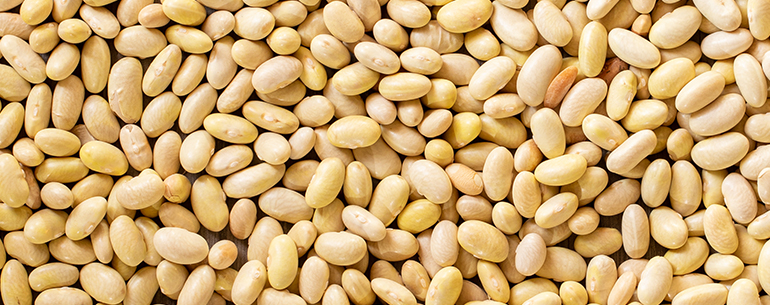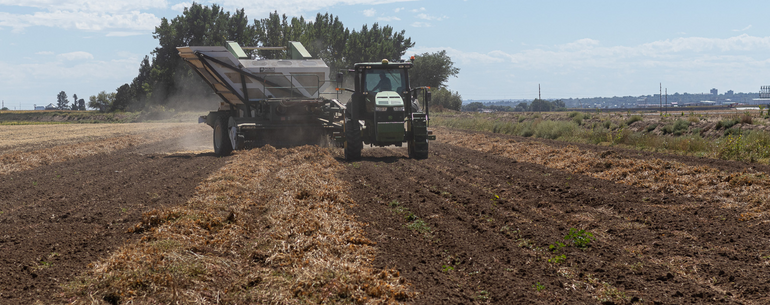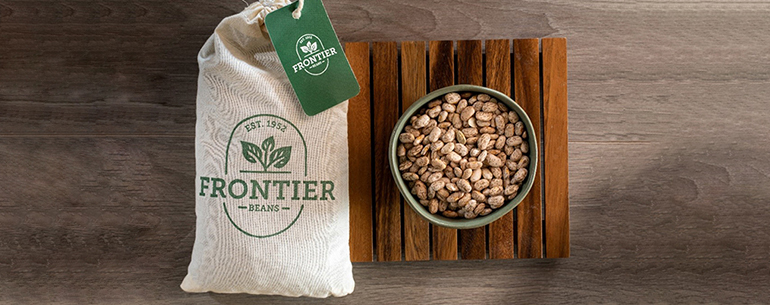The Many Health Benefits of Beans
February 02, 2023

Although the word ‘superfood’ has become increasingly common in recent years, real superfoods can be hard to find. Or, even if you can find them, they may come with a steep price tag. That is why all of us at Northern Feed & Bean are so honored to be able to offer our communities and customers beans, a true – and affordable – superfood! Let’s break down exactly what it is that makes beans so fantastic nutritionally, and what health benefits beans can offer us all.
Beans, like our pinto beans, are associated with a wide variety of health benefits.
Bean Nutrition and Promotion of a Healthy Body Weight
Beans have an incredibly unique nutritional profile. They are rich in both protein and fiber, something you do not find in many foods. In fact, beans are one of the best natural sources of dietary fiber on the planet. In just about 100 calories of beans (or roughly ½-cup cooked beans), you get about 7 grams of fiber and 7 grams of protein. This high, approximate one-to-one ratio of fiber-to-protein is not seen in other foods. For example, think of animal proteins, like steak, chicken, and eggs. These provide protein, but zero fiber. Vegetables, on the other hand, may contain good amounts of fiber, but generally not very much protein. Protein and fiber are both associated with helping keep us full, so eating beans is not only delicious, but it can also help us maintain a healthy body weight.
Beans are so special that they are actually counted in two food groups in the U.S. Department of Agriculture’s MyPlate, which is based on the Dietary Guidelines for Americans. Due to being very nutrient-dense and high in both fiber and protein, beans are included in both the Protein and Vegetables groups. Besides fiber and protein, beans also are packed with micronutrients, including potassium, iron, and B vitamins like folate. (Here is a helpful tip, too: to help your body absorb more of the iron, enjoy beans with vitamin C-rich foods, such as a squeeze of lemon, broccoli, tomatoes, or an orange after your meal. The vitamin C will make the iron more available to your body.) In addition, beans have no cholesterol and are low in fat and naturally gluten free.
Try this Lemony Masala Mayocoba Bean Curry.
Beans and Gut Health
Gut health is a hot topic lately, likely because it is linked to numerous other aspects of our health, including the prevention of chronic disease and the promotion of a strong immune system. One of the primary reasons beans are believed to be associated with benefits for gut health is their high levels of dietary fiber. In many countries, including the United States, fiber is drastically under-consumed, and this can result in negative public health outcomes. Luckily, beans provide an easy and tasty way to increase fiber intake!
Like we mentioned, a ½-cup of beans contains approximately 7 grams of fiber. But what does that actually mean in terms of the daily recommended intake for fiber? The fiber recommendation is based on caloric intake, with a recommended 14 grams per 1,000 calories. So, an individual consuming 2,000 calories should get at least 28 grams of fiber. That means that eating just 1 cup of cooked beans already gets you about halfway to the recommendation! Now, you may be thinking that fiber supplements could also work. But, research suggests that whole foods are ideal to promote gut health, not processed foods or supplements.
The natural question is, “How many beans should I eat for ideal health?” Research is still ongoing, but it certainly appears that choosing to have lots of fiber-rich beans in your diet is a good choice. One recent study found that benefits for gut health really seemed to begin when at least 35% of dietary protein in the diet comes from bean.
Beans and Chronic Disease Prevention
Beans are associated with the prevention of several chronic diseases, including type 2 diabetes, cardiovascular (or heart) disease, and certain types of cancer, such as colorectal cancer. This is likely because beans are nutrient-dense (meaning high in nutrients relative to the number of calories contained). It is important to also note that in addition to protein, fiber, vitamins, and minerals, beans also contain complex carbohydrates. These carbohydrates are good for our health and can help control blood sugar. Beans have a low glycemic index, meaning that unlike refined carbohydrates like white bread and sugar, the complex carbohydrates in beans result in a slower, smaller effect on blood sugar levels.
The World Cancer Research Fund and American Institute for Cancer Research conducted a robust review of the scientific literature and outlined several Cancer Prevention Recommendations intended to reduce the likelihood of developing cancer and other chronic diseases over the lifetime. Paramount among these were to “be a healthy weight” and to “eat whole grains, vegetables, fruit and beans.” Specifically, their recommendation is to make beans and these other healthy foods a major part of our daily diets, citing that, “There is evidence that eating wholegrains, fiber, vegetables and fruit can help protect against certain cancers, as well as against weight gain, overweight and obesity.” They further recommend eating at least 30 grams of fiber every day, explaining that there is strong evidence that fiber-rich foods can protect against colorectal cancer and help maintain a healthy weight.

Delicious, buttery, creamy Mayocoba beans, one of our most popular beans.
Improving Your Health with Beans
As you can see, beans are a nutritional powerhouse and a very impressive superfood indeed! Here at Northern Feed & Bean, we offer five varieties of Colorado Proud beans: pinto beans, Mayocoba beans, black beans, small red beans, and orca beans. Including beans in your daily diet may offer many benefits for the health of you and your family, and we are honored to provide you with the highest quality beans. Health never tasted so good!
From our Frontier beans family to yours!
Looking for more information about the benefits of beans? You can download a one-page handout with great bean information on the Colorado Dry Beans website. Plus, you can also find more information about tips to cook beans more quickly, so you can get delicious and nutritious beans on your table faster!



